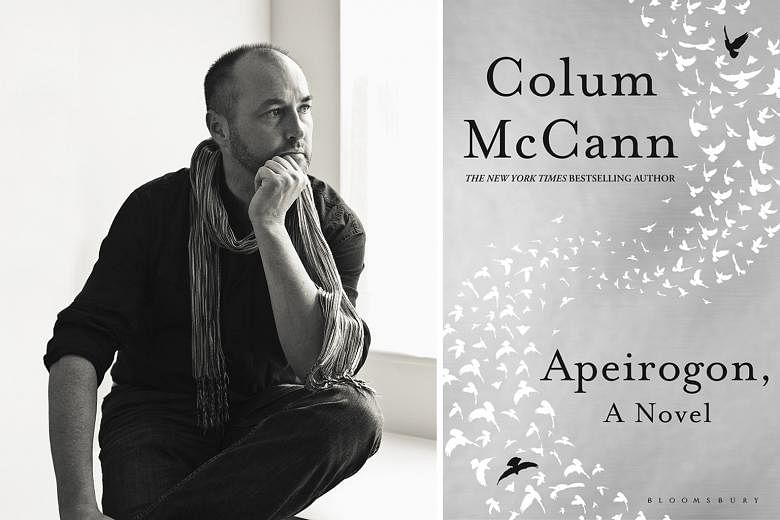Rami Elhanan and Bassam Aramin are unlikely friends. Rami is Israeli; Bassam is Palestinian.
From the roads they are allowed to drive on to the checkpoints they must negotiate, they come from worlds set in opposition. But one devastating thing unites them: Both have lost their young daughters to violence.
Smadar Elhanan, 13 going on 14, is shopping for books with her friends on a street in the heart of Jerusalem when three suicide bombers blow themselves up.
A decade later, in the West Bank town of Anata, 10-year-old Abir Aramin goes to the grocery store to buy a candy bracelet and is shot in the back of the head by a rubber bullet from a border guard's gun.
Rami and Bassam are real people, and the stories of their daughters are well-documented.
National Book Award-winning Irish writer Colum McCann bases his seventh novel on this friendship - interviews with the two men form the core of the book - but the novel shatters outwards from there in an incredible feat of storytelling.
An apeirogon is a shape with a countably infinite number of sides. McCann's narrative comprises 1,001 fragments of fact and fiction - histories, memories, quotes, photos and even soundwaves - mapped scattershot like the shards of an explosion in the moment of the blast, the pieces of an unsolved jigsaw, the widening gyre of a flock of birds.
Mixed in with the myriad abstractions of algebra, alephs and the Arabian Nights are seemingly random but subtly relevant nuggets of information.
For instance: "The prototypes for rubber bullets were discovered in the 1880s when small pieces of splintered broom handle were fired by the Singapore police at rioters in the streets."
Here and there, too, are excruciating minutiae from the Israeli-Palestinian conflict: the shape of a suicide bomber's eyeball stranded on a cafe awning, the number of hours it takes to get through checkpoints to the hospital with a dying girl in your arms.
Before they are fathers, Rami and Bassam are fighters. Rami, the son of a Holocaust survivor, is a soldier in three of Israel's wars. He has killed people "distantly, like in a video game".
-
FICTION
-
APEIROGON
By Colum McCann
Bloomsbury/Paperback/480 pages/$27.95/Available here
4.5 Stars
At the age of 17, Bassam is sentenced to seven years in a brutal prison for throwing broken hand grenades at Israeli jeeps.
Years later, they become friends through Combatants For Peace, an organisation of both Israelis and Palestinians against the occupation.
Apeirogon has little new political insight to offer on Israel and Palestine, and McCann's anxiety as an outsider covering one of the world's most controversial conflicts shows in his carefulness.
But the novel's strengths lie in the intricacy of its collage and the way it finds space for singular grief.
Giving lectures on Smadar, Rami begins to fear he is growing repetitive, that his grief for his daughter has become a performance. Later he realises there is nothing theatrical about it; theatre has the privilege of ending.
"His was a beginning without an end," writes McCann. "He settled into the repetition: it was his blessing and his curse."
Rami tells his listeners that there is not a minute of his waking life that he does not think of Smadar, exaggerated though this may sound over the stretch of 19 years. He sees the recognition of this in the eyes of others who have lost someone, "the grief carried within them like clocks".
Elsewhere, Bassam's wife, Salwa, mourns in silence, refusing the journalists who would make a spectacle of her anger.
"She was not called upon to tell her story," writes McCann. "It lived, instead, in the aspects of her devotion."
Edward Said, a well-known critic of the Palestinian situation, wrote: "Survival, in fact, is about the connection between things."
Apeirogon is a story in the moment of its shattering, but every piece of it is seeking connection with the others.
What is most remarkable about the high-wire tension of this constellation is the way it holds its shape.
If you like this, read: My Happiness Bears No Relation To Happiness by Adina Hoffman (Yale University Press, 2009, $36.49, available here), a biography of Palestinian poet Taha Muhammad Ali, who was displaced from his village during the 1948 Arab-Israeli War, written by Hoffman, an American Jew based in Jerusalem.


